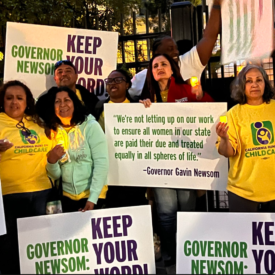Three weeks ago, Governor Newsom released his May Revision to the State Budget. In response, the State Legislature presented their response to the Governor’s proposed Budget this week. On Thursday, May 30 the State Assembly Budget Committee and State Senate Budget Subcommittee on Health and Human Services held hearings to engage with advocates, hold space for public comments, and vote on the budget plan that will be sent to the Governor.
Policy Updates
Governor Newsom’s May Budget Revision Proposes Major Cuts for 2024-2025 Fiscal Year – 5/16/24
This week the Senate and Assembly Budget Subcommittees met to discuss Governor Newsom’s May Revision to the State Budget. Both committees expressed concern, frustration, and confusion regarding the Governor’s suggested cuts and delays. Both houses raised questions over:
Child Care Law Center Response to Governor Newsom’s Budget Revision May, 2024 – 5/16/24
Each year, the Governor releases a spending plan for the state in January, and then revises it in May, after the April tax revenues are collected. Unfortunately, in this budget the Governor has not included adequate funding for any child care programs. Breaking his 2021 promise for 200,000 spaces by 2026-27, the Governor …
Meet Our New Executive Director: Maisha Cole
We’re thrilled to announce that Maisha Cole, currently the Deputy Director of the Law Center, will take over as Executive Director on June 1, 2024.
“I have always loved this organization,” said Maisha, “and I am passionate about early childhood education as a path to justice and great opportunity. When we support families, children and child care providers, we lay the foundation for a brighter future for everyone.”
Child Care Law Center Response to Governor’s January State Budget Proposal for FY 24-25 – 1/16/24
California’s state budget must reflect the values we hold most dear, and be just to everyone involved in child care – children, families, and child care providers. On January 10th, 2024, Governor Newsom announced his proposed 2024-25 budget. Three things to know about his proposal: …
Child Care Reforms in the State Budget Will Bring Transformative Change in 2023 and 2024
Our communities are stronger when every family has the child care they need. For too long, women of color have shouldered the expenses of the state child care system. Their health and well-being—and their families’—have suffered as a result. Thanks to the leadership of Parent Voices, Child Care Providers United, and key advocates, the State Budget this year will begin to right these wrongs.







